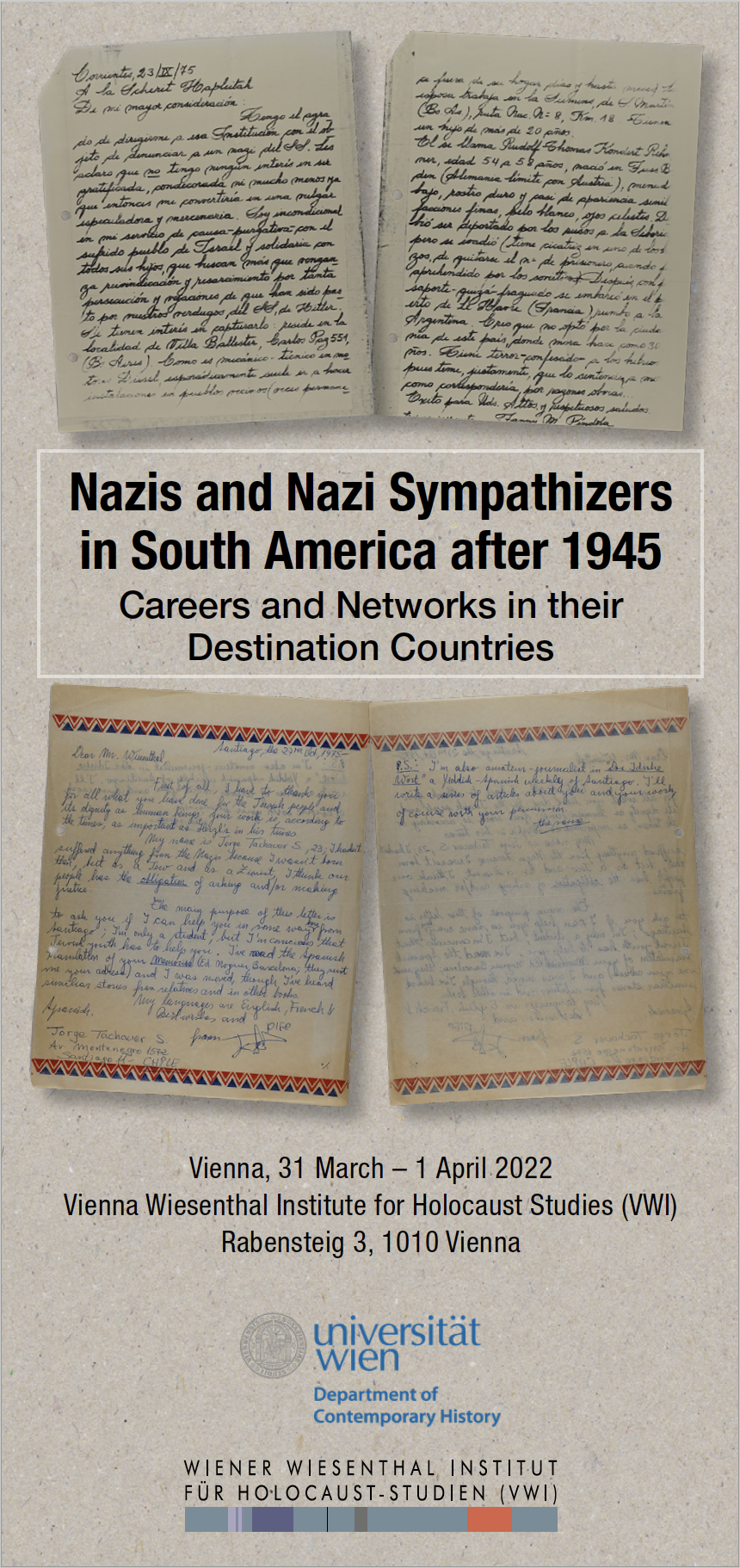| Workshop | |||
| Nazis and Nazi Sympathizers in South America after 1945. Careers and Networks in their Destination Countries | |||
von Donnerstag, 31. März 2022 - 10:00 Vienna Wiesenthal Institute, Research Lounge 1010 Vienna, Rabensteig 3, 3rd Floor
|
|||
Adolf Eichmann, Josef Mengele, Klaus Barbie, and Erich Priebke: These names are exemplary of the Nazi criminals who found refuge in South America after 1945. There, they either remained untroubled or were only made accountable for their crimes many years later. Investigations into their whereabouts in South America – when they were still alive – were conducted painstakingly among others by Simon Wiesenthal as well as the Klarsfelds. Since then, many publications by historians and journalists have dealt with the biographies of individual former Nazis (with the focus always lying on men), their escape routes, their acceptance into their destination countries, and partly also with their political activities in their new homelands. Aside from the prominent perpetrators and their thoroughly researched biographies, there were numerous other cases of more or less influential (former) Nazis and Nazi sympathizers who ended up in Argentina, Chile, and other South American countries. Their life trajectories and professional as well as private activities in their new homes have hardly been subject to systematic research to date. Their biographies and their new lives in South America will therefore be the focus of this workshop. Now, more than 75 years after the end of the Second World War, the aim is first to take stock of the state of the field. On this basis, we wish to address new research questions and to identify hitherto unmined source bases and new groups of individuals to be researched. The objective is thus to redefine the research field focusing on German and Austrian Nazis in South America and their (inter-)national connections. We will discuss new insights on the forms, paths, and networks of flight and migration and will raise questions such as: which conditions did the (former) Nazis and Nazi sympathizers encounter in South America? Which opportunities were offered by the destination states and the local societies for their integration and who were their individual and institutional cooperation partners? In which professional areas could they establish themselves? Can we detect continuities from the Nazi-era and what impact did they have on their post-war careers? What was the relationship between the (former) Nazis to locals and what mutual influences can we observe, especially within the elites? Thursday, 31 March 2022 10:00 Welcome Notes 10:15 Keynote 11:00 Old And New Connections: The Establishment Of Fugitive National Socialists In South America Martin Finkenberger (Bonn) Gustavo Guzmán (University of Potsdam/Tel Aviv University) Commented by Dorothee Schlüter (Buchenwald and Mittelbau-Dora Memorials Foundation) & discussion 12:30 Lunch Break 13:30 NS-Continuities in German Institutions After 1945 Daniel Stahl (Friedrich Schiller University Jena) Christian Cwik (University of Graz) Holger M. Meding (University of Cologne) Commented by Linda Erker (Vienna University) & discussion 15:00 Coffee Break 15:15 Rome as a Hub for Nazis on the Run: Migration Management and Support for War Criminals After 1945 Suzanne Brown-Fleming (United States Holocaust Memorial Museum, Washington D.C.) Klaus Taschwer (Vienna) Commented by Kerstin von Lingen (Vienna University) & discussion 17:00 Guided Tour Through the Simon Wiesenthal Archive Kinga Frojimovics/Marianne Windsperger (VWI) 19:00 Podium Discussion, Bookshop Singer am Rabensteig 3 The Legacies of Simon Wiesenthal: The Simon Wiesenthal Center and the Vienna Wiesenthal Institute for Holocaust Studies – Looking Back, Moving Forward Participants: Brigitte Bailer (DÖW), Shimon Samuels (SWC Paris), Efraim Zuroff (SWC Jerusalem) Moderated by Alexia Weiss (WINA) Friday, 1 April 2022 9:30 Austrian National Socialists in Argentina: Old Comrades From Vienna Robert Obermair (University of Salzburg) Jutta Fuchshuber/Andreas Schrabauer (Vienna University) Commented by Margit Reiter (University of Salzburg) & discussion 11:00 Coffee Break 11:10 Export/Import. Chemists In Military Research in Argentina Under Perón Jason Lemberg (Goethe-University Frankfurt a. M.) Linda Erker (Vienna University) Commented by Sandra Carreras (Ibero-American Institute Prussian Cultural Heritage Foundation) & discussion 12:40 Lunch Break 13:45 New Perspectives on Familiar Faces. Writing History In A Different Way Karin Harrasser (University of Art and Design Linz) Ursula Prutsch (Ludwig-Maximilians-University Munich) Commented by Erhard Stackl (Vienna) & discussion 15:15 Closing Session Organised by the Vienna Wiesenthal Institute for Holocaust Studies and the Department of Contemporary History at Vienna University Concept: Linda Erker (Vienna University) In cooperation with the Department of History at the University of Salzburg and Ibero-American Institute Prussian Cultural Heritage Foundation. Image: Letters to Simon Wiesenthal supporting his investigations on Nazis in South America, Correspondence 1945–2015, VWI.SWA.III.9 This will be a live event only. Due to limited number of places, we kindly ask you to register at Diese E-Mail-Adresse ist vor Spambots geschützt! Zur Anzeige muss JavaScript eingeschaltet sein! by 24 March 2022. We will then confirm your participation and inform you about the COVID-safety regulations in place via e-mail. By participating in this event, you consent to the publication of photos, video and audio recordings that are made during the event. |
|||







